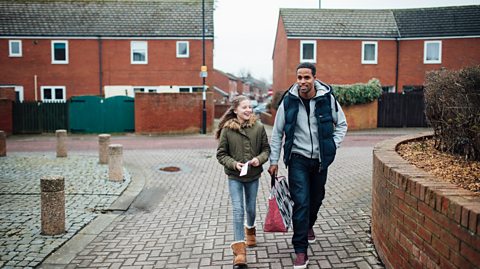Whether itтs the loss of a close relative, friend, pet or public figure, death can be hard to deal with. So how can we explain bereavement to children and support them in their sadness?
We asked Clare Bullen, Head of Clinical Services at Child Bereavement UK, to share her advice for talking about death with children and young people.



Provide opportunities for children to talk and ask questions
When processing the death of a loved one, children may have trouble sleeping, have an increase in anxiety or begin to feel indifferent about their lives. Being able to talk and ask questions will help them express their feelings and worries.
Child Bereavement UK supports children and young people up to the age of 25 who are bereaved of anybody important to them. тOur underlying advice, regardless of age, is to give opportunities for children and young people to talk and to ask questions about death and to provide them with honest answersт explains Clare.
тIt's really important to normalise grief. Grief is a natural and normal response to the death of somebody important to you, no matter who they were.т
тProcessing death is like a jigsaw for children, they are trying to put all the pieces together. So, when they ask questions, itтs because theyтve got a missing piece of the jigsaw and it doesn't make sense. Children have wonderful imaginations, if we donтt give them the answers to help them make sense of what's happened, then they can sometimes create a story which can often be a lot scarier and a lot worse than the reality itself.т

Sometimes children donтt feel able to ask questions as they worry about upsetting people. тWe as a society often avoid talking about death. So, for children, that creates a stigma or fear around itт says Clare.
Talking about death openly and comfortably can alleviate some of their worries and begin their journey of understanding grief.
тIt's really important to normalise grief. Grief is a natural and normal response to the death of somebody important to you, no matter who they were.т

Acknowledge that there will be good days and bad days

Grief may stay with us for the rest of our life. Some days we may feel in control of our grief but on other days we could feel completely broken.
тWhen it comes to grieving, we all carry around an invisible suitcase where we pack our feelings and emotions away. Sometimes the suitcase can become quite full, and we can feel out of controlт explains Clare.
тYounger children tend to тpuddle jumpт. This is when a child is desperately sad, crying and really demonstrating their grief. And then in the next moment they could be happy and laughing or wanting to play games. That тpuddle jumpingт is actually a very safe and normal way to grieve. But of course, because we as adults don't do that, we can sometimes misinterpret children.т
тFor older children and teenagers, they can sometimes put on a mask. But of course, what grief does is sometimes causes that mask to slip. When they've got the mask on, everything's okay. And for whatever reason, that wave of grief, whether it's a smell, a sound or a memory, washes over them and they get really upset. This can lead to them feeling embarrassed or angry that theyтve not been able to control it.т
It's important to acknowledge that itтs ok to feel emotional at times and to not be afraid of showing that emotion.
Child Bereavement UK has explaining тpuddle jumping.

Explain that grieving is personal to each individual

Itтs also important to acknowledge that itтs ok to feel however you feel and understand that everybody expresses grief in different ways.
тAs adults or parents, we should feel comfortable sharing how we feel with children. If we model how to articulate our emotions, children will often reciprocate which will help them understand their feelings a bit betterт explains Clare.
тHowever, sometimes children may say that they donтt feel upset. Or they may say that they feel like they should be more upset. Itтs essential to not make judgements or put expectations on children to feel how we may feel. We should always explain that everybody grieves in their own way and there is no correct way to process death.т
тSometimes children move away from their family ties and look for support from their peers. This can be so difficult and upsetting for parents. However, this can be the childтs way of trying to тprotectт the family. Peer support groups can be so helpful for children to be able to meet other young people that have had a similar experience and this may help them open up to their families later down the lineт says Claire.

Remember the person who died

Providing opportunities to remember the person who died can often make grief more manageable.
тWe should be really mindful of special occasions, birthdays, anniversaries etc. Not talking about the person who passed away can feel like the elephant in the room. Even though they arenтt physically around, itтs important to keep their memory alive for children and remember the good timesт says Clare.
тAs adults or parents, we should feel comfortable sharing how we feel with children. If we model how to articulate our emotions, children will often reciprocate which will help them understand their feelings a bit betterт

Take care of yourself and seek support
We canтt pour from an empty cup, so itтs important to look after ourselves in order to best support our children. There may be times when you donтt have the answers or when you feel overwhelmed and thatтs ok.
This Parentsт Toolkit article features six self-care tips for parents.

There are many support groups for families who have lost a loved one. You can also speak to friends, family, or your GP.
If you, or someone you know, has been affected by bereavement, there are a number of organisations listed here on the ТщЖЙдМХФ Action Line that may be able to help.
support bereaved people in Scotland.
Barnardo's offer a list of service available in Northern Ireland .
Dewis Cymru has a that lists bereavement services in Wales.
For more advice and guidance, you can also call the or visit their website for more support.

More from ТщЖЙдМХФ Bitesize Parents' ToolkitтІ
Parents' Toolkit
Fun activities, real-life stories, wellbeing support and loads of helpful advice - we're here for you and your child.

Loss, grief, and bereavement. collection
A collection of articles to help parents explain difficult times for them and their child.

Wellbeing advice. collection
From healthy eating to mental health, we've got advice for all the family.

How to help your child understand upsetting news
Advice to help parents explain worrying news like natural disasters, the death of a public figure, violent crime, or war, to a child?

Four steps to chatting with your child about their mental health
Starting a conversation about mental health isn't easy. Especially if your child is reticent to open up. This advice from the charity Young Minds may help.

Is my child showing signs of trauma, or is this normal?
Tips from the Anna Freud Centre on spotting the difference between signs of stress and signs of trauma in children.
